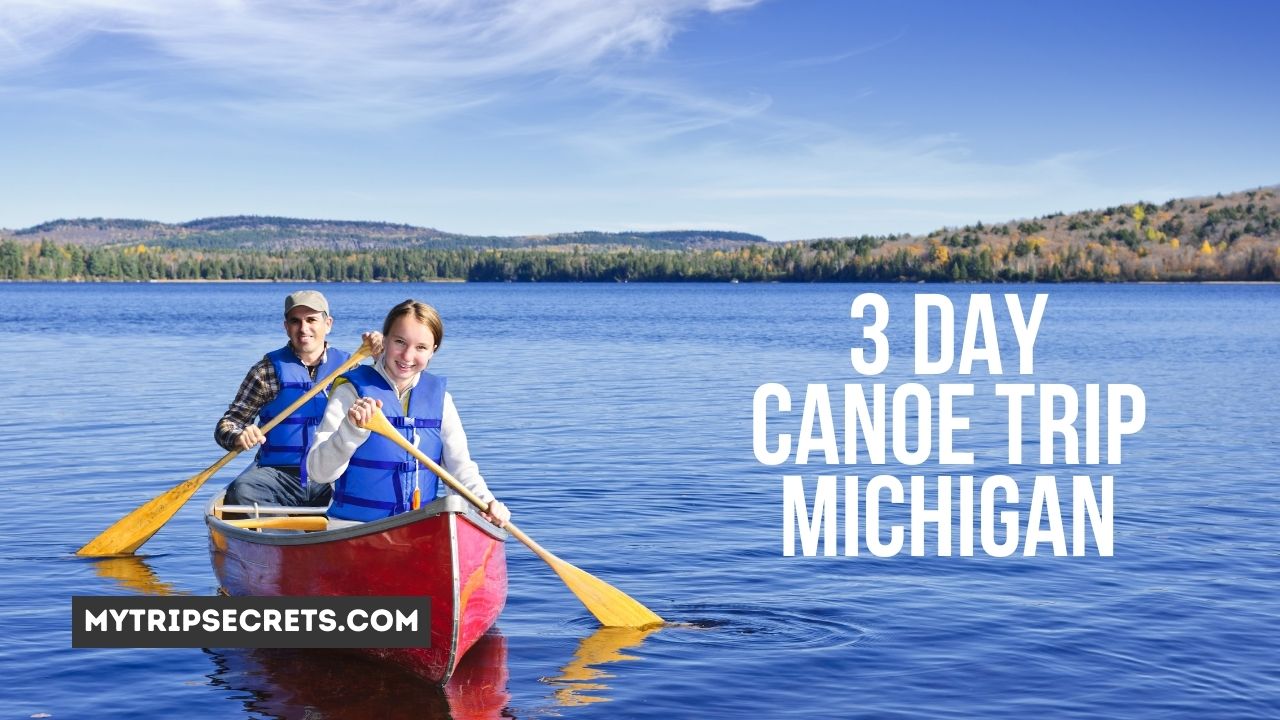The vast freshwater lakes, winding rivers, and tranquil forests of Michigan offer idyllic settings for multi-day canoe camping adventures. As thawing spring ice gives way to warmer months, paddlers flock to waterways across the Great Lakes state, vessels loaded with camping gear in tow. A 3 day canoe trip Michigan allows immersed exploration of this abundant natural beauty while serving as a test of both mental and physical endurance.
Whether you’re a first-timer or seasoned pro, planning considerations around routes, timing, supplies, hazards, and environmental ethics will set you up for an unforgettable trek across still backwaters, rushing rapids, and everything in between. Paddles at the ready for an outdoor challenge certain to create indelible summer memories amongst Michigan’s wooded isles and sandy shores. Here’s an in-depth guide on how to plan an epic 3 day paddling adventure in Pure Michigan.
Contents
- 1 3 Day Canoe Trip Michigan
- 2 Must-Have Gear
- 3 Choosing Campsites
- 4 Guide Services
- 5 Permits, Rules & Regulations
- 6 Food & Water
- 7 Safety
- 8 Training & Building Skills
- 9 Eco-Friendly Planning
- 10 Frequently Asked Questions
- 10.1 How long are Michigan’s multi-day canoe trails?
- 10.2 What time of year is best to canoe camp?
- 10.3 How many miles should a beginner paddle in one day?
- 10.4 Can you drink unfiltered water from Michigan lakes/rivers?
- 10.5 How cold do Michigan rivers get at night in summer?
- 10.6 What are regulations on campfires?
- 11 Conclusion
3 Day Canoe Trip Michigan
Western Michigan Rivers
Western Michigan offers some incredible multi-day paddling options. The Muskegon River flows over 200 miles from Houghton Lake to Muskegon, with calm sections perfect for beginners and Class I-III rapids for thrill seekers. The standalone Manistee River Trail guides you for over 20 miles along the river with great camping spots.
The Au Sable River runs 138 miles through Grayling and provides a peaceful trip through the Au Sable State Forest. For wildlife viewing, head to the Pere Marquette River and keep an eye out for bald eagles, osprey, beavers, mink, and more.
Northeastern Water Trails
Northeastern Michigan holds the majority of Michigan’s 11,000 lakes. One exceptional paddle is the Beaver Island Archipelago, surrounding the largest island in Lake Michigan. Explore the protected bays and inlets by day and enjoy the island culture at night.
For breathtaking views, head to the Les Cheneaux Islands northeast of the Mackinac Bridge. Its 36 islands feature excellent fishing, bird watching, shipwreck visits, and options for loop routes or out-and-back trips.
Additional Routes
Other notable 3 day routes include paddling among the sand dunes on Lake Michigan, exploring the inland lakes around Traverse City along the Grand Traverse Water Trail, or heading out into Lake Huron on Michigan’s Sunrise Coast Paddling Trail. The options are virtually endless in Pure Michigan!
Route Length Comparison
| Route | Length | Skill Level | Highlights |
|---|---|---|---|
| Muskegon River | 78 miles | Beginner-Advanced | Scenic, rapids available |
| Manistee River Trail | 20 miles | Beginner | Great campsites |
| Au Sable River | 138 miles | Intermediate | Forest views |
| Beaver Island | 50+ miles | Beginner | Lake Michigan islands |
| Les Cheneaux Islands | 20+ miles | Beginner | Protected channels |
Must-Have Gear
Essentials
The gear you pack for a 3 day trip goes a long way in determining how comfortable and safe your Michigan canoe adventure will be.
Be sure to waterproof your gear and pack layers to prepare for Michigan’s temperamental weather – warm afternoons can easily turn into cold, rainy nights. Other must-haves include:
- Canoe with paddles, life jackets
- Tent, sleeping pads, sleeping bags
- Camp stove, fuel, cooking equipment
- Food (non-perishable)
- Water filter/purifier
- First aid kit
- Headlamp, biodegradable toilet paper
- Waterproof bags/containers
- Insect repellent, sunscreen
- Map, compass
Luxury Upgrades
To relax after hours of paddling, upgrade your site with:
- Camp chairs, hammock
- Waterproof bluetooth speaker
- Camp pillows
- Lanterns
- Firewood for campfires
- Fishing poles
Clothing Essentials
Michigan weather can quickly shift from hot and humid to freezing rain. Pack layers to adjust on the fly:
- Moisture-wicking base layers
- Fleece mid-layers
- Waterproof outer shell (jacket, pants)
- Wide-brimmed hat
- Extra wool socks
- Water shoes
- Hiking shoes
Choosing Campsites
Michigan offers a mix of public and private campsites to spend your nights under the stars.
Rustic Riverbank Sites
For a serene night, claim one of the first-come, rustic sites along Michigan’s designated water trails. Sites feature fire rings and picnic tables. Bring a trowel for restroom needs.
State/National Forest Campgrounds
Improved campgrounds within Michigan’s state and national forests provide toilets, water pumps, and picnic tables/fire rings at each site. Some accept reservations.
Huron-Manistee National Forests
Porcupine Mountains Wilderness State Park
Private Campgrounds
Privately owned campgrounds offer full amenities like showers, electric/water hookups, wifi, convenience stores, and recreation options. Note many require reservations.
Timber Ridge RV & Recreation Resort
Guide Services
For first-time paddlers, hiring a guide service takes the guesswork out of planning a multi-day adventure. Leave transportation logistics, gear, permits, and meal planning to the professionals.
Uinta Wilderness Outfitters
Uinta Wilderness leads guided tours focused on nature immersion, wilderness skills, and environmental ethics. Their 4 day Manistee River trip shares an in-depth experience of river ecology.
Lanseaux Expeditions
Lanseaux Expeditions provides fully outfitted, guided camping in the Les Cheneaux Islands. Their expertise enhances wildlife viewing, fishing, shipwreck tours, and relaxing amid northern Michigan’s islands.
Permits, Rules & Regulations
Michigan’s rivers and water trails each have specific guidelines in place for preserving local ecosystems and respecting neighboring landowners.
Before embarking on a trip, research any necessary permits and be prepared to pack out all trash. Fires may be limited during dry seasons and noise should be kept to a minimum.
Most water trails prohibit motors. Be sure to carefully scout rapids beforehand and portage if necessary. Note trip lengths are intended for intermediate paddlers under ideal conditions. Beginners will require more time.
Food & Water
Amid miles of paddling, you’ll quickly burn thousands of calories and require hydration. Careful meal planning keeps energy levels high.
Menu Ideas
Pack non-perishable nutritious snacks like trail mix, protein/granola bars, jerky sticks, and dried fruit. Prepare no-cook meals like sandwiches, wraps, crackers with peanut butter, or tuna pouches.
For cooked meals, focus on one-pot, easy to make meals like pasta, rice dishes, chili, or soup. Foil packets with vegetables and meat cook easily at the fire. Bring coffee/tea to stay warm and plenty of water.
Water Access en Route
When possible, collect water from lakes and streams to avoid carrying days worth of water. Be sure to filter and treat any natural water sources before drinking. Many improved campsites will have potable water pumps available.
If water sources will be very limited, consider bringing a portable water purifier, like the popular Sawyer Squeeze filter.
Safety
While Michigan’s rivers and lakes inspire awe, respect their power. Ensure safety with these tips:
Check River Levels
In high water periods like spring snowmelt, rivers run stronger with dangerous rapids and fast undercurrents. Plan summer trips when water is lower for an ideal float.
File a Float Plan
Inform someone not on the trip about your intended route, camp locations, total members, and expected return. Ask them to call emergency responders if they don’t hear back from you on time. Having someone aware of your location can save critical hours during an emergency.
Pack Proper Safety Gear
Every member should wear a properly fitted life jacket at all times and have a whistle and waterproof headlamp handy. Keep throw ropes, carabiners, and emergency blankets accessible as well. Store gear tightly so items don’t fly away if capsized.
Scout Unfamiliar Sections
When approaching unfamiliar rapids, eddies, or low clearance areas, carefully scout ahead on foot first whenever possible. Turn back if conditions seem unsafe for your party’s skill level.
Maintain Three Points of Contact
While launching boats, crossing slippery rocks, or completing portages – maintain three points of contact to avoid falling into cold water. Move carefully.
Training & Building Skills
To properly enjoy multi-day paddling trips in Michigan and stay safe, hone your skills through classes, practice, and short trips before embarking on a 50+ mile journey.
Take a Course
Enroll in a beginner paddling course to learn how to efficiently paddle tandem and solo boats. Specifically practice self-rescue techniques like emergency wet exits.
Join your local paddling association like the Michigan Canoe Racing Association to find open paddle events as well as connect with mentors.
Trip Progression
Start with short, 4-5 mile day paddling loops close to home waters to grow assured handling wind, waves, loading gear, reading maps, etc. Slowly build up experience with overnight journeys less than 15 miles from access points before tackling remote multi-day treks deep into Michigan’s forests.
Eco-Friendly Planning
With Michigan’s delicate ecosystems facing threats from invasive species and climate change, follow strict Leave No Trace principles on your canoe trip to respect the environment. Plan ahead with these steps:
Research Guidelines
Inspect trail regulations to note any restrictions on campfires, site limits, catch-and-release fishing policies, and required permits. Time trips outside of wildlife breeding seasons when possible.
Pack Out All Waste
Carry reusable containers to avoid disposable plastic bottles and bags. Be prepared to pack out all trash, leftover food, and human waste. Use biodegradable soap. Properly dispose of waste at home.
Stay on Trails
Stick to marked portage routes and campsites to avoid trampling shoreline vegetation and disturbing wildlife. Never move rocks or cut live branches.
Prevent Cross-Contamination
Clean gear properly and drain water far from shore to avoid spreading invasive species between waterways in bilge, bait buckets, etc. Don’t transport firewood.
Frequently Asked Questions
How long are Michigan’s multi-day canoe trails?
The length of well-known water trails ranges from around 20 miles for loops like the Manistee River Trail, all the way up to over 200 miles on the Muskegon River, Michigan’s longest designated water trail. Plan beginner trips for under 50 miles total.
What time of year is best to canoe camp?
Late summer to early fall provides ideal paddling conditions with less bugs, warmer water, and fewer crowds than peak season. Avoid early spring when dangerously high waters and cold temperatures persist.
How many miles should a beginner paddle in one day?
H4> Expect to cover 8-12 miles per day as a beginner if you take breaks. Intermediate paddlers can tackle 15-20 miles but pace yourself to avoid injury over consecutive long days.
Can you drink unfiltered water from Michigan lakes/rivers?
Untreated surface water exposes you to bacteria, viruses, and parasites even if it looks clear. Always filter/treat water before drinking. Portable filters like the Sawyer Squeeze are highly effective and lightweight for multi-day trips.
How cold do Michigan rivers get at night in summer?
While daytime summer temps may hit 80°F, northern Michigan rivers and lakes typically only reach 60-70°F due to meltwater sources. Overnight lows can dip into the 40s or colder. Pack warm layers and wool socks.
What are regulations on campfires?
Fire restrictions vary between trails. Some ban campfires during dry periods while others provide fire rings at designated sites. Check current guidelines and always fully extinguish ashes after use. Consider a backpacking stove instead.
Conclusion
Embarking on a 3 day canoe adventure across Michigan’s incredible network of inland lakes, rivers, and island trails provides memories to last a lifetime. As one of the most water-rich states in the U.S., the possibilities seem endless. From cascading rapids to flat marshes perfect for wildlife viewing, Michigan’s rich landscapes satisfy any paddler.
By carefully planning your route, packing proper gear, brushing up on safety essentials, respecting leave no trace ethics, and preparing for Michigan’s dynamic weather, you’re sure to have an epic journey paddling Pure Michigan. Just don’t forget the sunscreen and bug spray!

